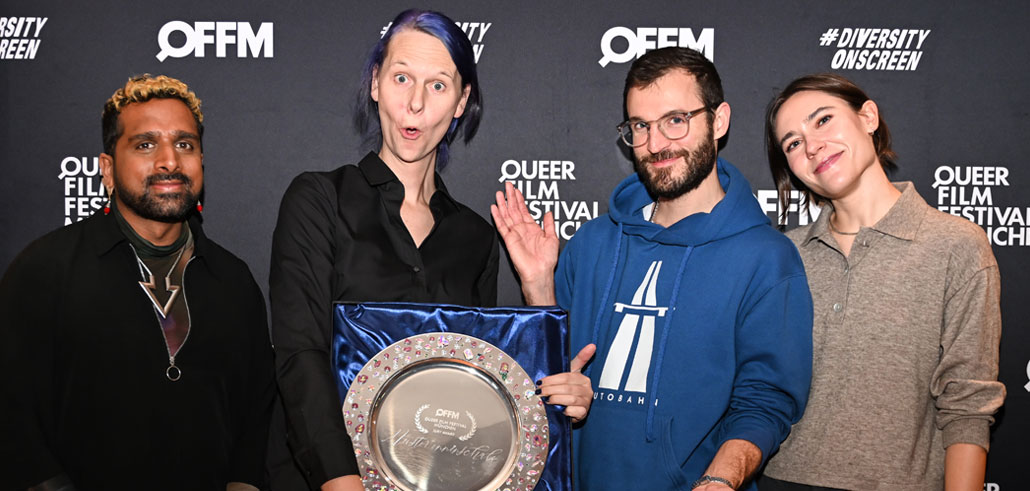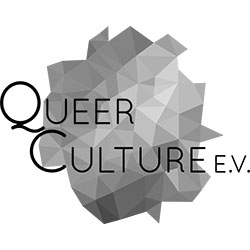JURY PREIS REDE | JURY PRIZE SPEACH 2022
© Stanley Reagh
DE
Welcher Film ist queer? Was macht einen Film queer? Geht es um Repräsentation, geht es darum, wer erzählt, was erzählt wird und wie? Letzten Endes sollten Filme jedoch nie verglichen werden, sondern für sich selbst, als künstlerische Vision ihrer SchöpferInnen stehen.
Und doch war genau das unsere Aufgabe als Jury. Wir mussten einen Weg finden, um die ruhige und feinfühlige Natur von Filmen wie The Blue Caftan, mit der Ungeduld und Wut von The Hill Where the Lionesses Roar zu vergleichen. Unsere Zeit auf dem Filmfestival bestand aus ständigen Diskussionen, Austausch, Überlegungen und Befragungen untereinander. Und obwohl wir uns in vielen Punkten und Gedanken im Grunde einig waren, war es am Ende unglaublich schwierig, einen einzigen Gewinnerfilm auszuwählen.
Queeres Kino bedeutet nicht, so viele Punkte wie möglich abzuhaken. Queerness ist ein Spektrum, wie ein galaktischer Nebel, und Filme sind schillernde Planeten mit ihren eigenen Bahnen und vielfältigen Erscheinungsformen. Aus unserem Blickwinkel, durch das Teleskop, ist es unmöglich, allen gerecht zu werden. Das queere Universum ist unendlich und weitläufig und es gibt keine Möglichkeit, es von einem bestimmten Punkt aus vollständig zu erfassen.
Doch Filme existieren nicht losgelöst vom Kontext. Sie sind mit unserer Erfahrung, unseren Geschichten und unseren Vorstellungen von dem, was möglich ist, verbunden. Filme können eine Erkundung unserer vergessenen Vergangenheit sein, aber gleichzeitig auch unser Verständnis der Gegenwart erweitern. Sie können Narrative miteinander verbinden und uns daran erinnern, dass die Geschichte von Queers immer wieder ausgelöscht wurde und wie Sterne aus der Dunkelheit wiedergeboren werden kann.
Aufgrund dieser ergreifenden Mahnung daran, dass Transidentität nicht nur eine Geschichte des Überlebens ist, sondern auch eine Geschichte der Freude am Leben, möchte die Jury eine besondere Erwähnung an Framing Agnes vergeben. Die eindringliche Darstellung des Lebens von Transmenschen durch die beharrliche Recherche in lange verborgenen Archiven, erinnert uns daran, dass Transmenschen schon immer in das Gefüge unserer Gesellschaften eingewoben waren. Die Gemeinschaften, die ihr Überleben ermöglichten, ließen sie auch auf einzigartige und wundersame Weise gedeihen. Framing Agnes gibt uns Hoffnung, indem der Film uns die Vergangenheit auf fantasievolle und kreative Weise vor Augen führt und uns die Botschaft vermittelt, dass das Leben von Transmenschen sowohl innerhalb als auch außerhalb des Blickfeldes glorreich, friedlich und voller Liebe sein kann.
Filme können uns den Weg zeigen, sowohl explizit als auch implizit. Der Gewinnerfilm strotzt vor Ideen und Ambitionen. Die Filmemacher verweben die Überschneidungen von Klasse, Migration, Geschlecht, Rasse, Behinderung und Technologie, indem sie Portale für neue Sichtweisen auf die Welt öffnen. Die gewählte Ästhetik ist lyrisch, musikalisch, aber in der Realität verankert. Der Film wagt es, unsere gelernte Art und Weise, Filme zu produzieren und zu konsumieren, auf den Kopf zu stellen und formuliert gleichzeitig eine scharfe soziopolitische Kritik. Die MacherInnen liefern uns einen afrofuturistischen Science-Fiction Film, der die Ketten des Genres sprengt und die Erwartungen der Zuschauenden an das zeitgenössische Kino herausfordert.
Auch wenn er sich manchmal erzählerisch abstrakt und ausufernd zyklisch anfühlt, ist er doch durch seine materiellen Strukturen und der Produktionsmethode geerdet. Die RegisseurInnen Saul Williams und Anisia Uzeyman sind sich des Potenzials ihres Handwerks voll bewusst. Die Hauptfigur reist von einem Zeitalter zum anderen, von einem Ort zum anderen, von einem Geschlecht zum nächsten und ist VermittlerIn der Transformation. Es ist äußerst komplex und herausfordernd, Vergangenheit, Gegenwart und Zukunft miteinander zu verbinden. Ein kritischer, selbstreflektierter Blick zurück ist wichtig und notwendig. Der Film ist reich an Symbolen, die die Vergangenheit mit der Gegenwart verbinden und für die
Zukunft neu interpretieren können.
Ja, Neptune Frosts Geschichte ist schwer in Worte zu fassen, aber das ist Teil ihres unbeschreiblichen Zaubers. Licht und Energie strömen von der Leinwand aus. Der Film ist fantasievoll, innovativ und radikal. Während diese Kunstfertigkeit beeindruckt, vergisst der Film nie seine Botschaft der Befreiung. Die visionären Spekulationen der FilmemacherInnen verbinden das Spirituelle mit dem Didaktischen, das Irdische mit dem Unvorstellbaren und halten dabei die Balance zwischen erschreckendem Realismus und politischer Tragödie. Der Preis der Jury des Queer Film Festivals München 2022 geht an Neptune Frost.
EN
The Jury would like to thank Queer Film Festival Munchen for hosting a Jury Competition for the 2022 Festival. The selection of films this year challenged us as filmmakers, writers, and artists to ask essential question about the nature of queer cinema.
What is queer film? What makes a film queer? Is it about representation, is it about who tells what is told and how? Ultimately though, films were never meant to be compared, they were meant to stand on their own as an artistic vision of its creators.
And yet, that was exactly our task as the jury. We had to find a way to compare the calm and sensitive nature of films like Blue Kaftan to the impatience and fury of The Hill Where the Lionesses Roar. Our time at the film festival consisted of continuous discussions, exchanges, reflections and investigations amongst each other. And although we were basically on the same page on many points and thoughts, it was incredibly difficult to choose a single winning film in the end. queer cinema does not mean ticking off as many points as possible. Queerness is a spectrum, like a galactic nebula, and movies are dazzling planets with their own orbits and multiple states. From our point of view through the telescope, it is impossible to do justice to all. The queer universe is infinite and vast and there is no way to fully taken in any fixed point.
Yet films do not exist out of context. They are connected to our histories, our stories, our imaginations for what is possible. Films can be an exploration of our forgotten past but simultaneously can also expand our understanding of the present. They can connect narratives and remind us that queer histories have survived erasure time and time again and like stars are often reborn out of the darkness. It is because of this poignant reminder that transness is not only a story of survival but also a story of the joyous ways in which people can live the jury would like to award a Special Mention to Framing Agnes. Its powerful portrayal of trans lives through the persistent research into long hidden archives reminds us that trans people have always been weaved into the fabric of our societies. The communities that enabled their survival also allowed them to thrive in unique and wondrous ways. Framing Agnes gives us hope by placing the past in front of us in an imaginative and creative way leaving us with a message that trans lives can be glorious, calm, and full of love both in and out of the frame.
Films can show us the way, both explicitly and implicitly. The winning film is brimming with ideas and ambitions. The filmmakers weave together the intersections of class, migration, gender, race, disability and technology by opening portals to new ways of seeing the world. The chosen aesthetic is lyrical, musical, but rooted in reality. The film dares the risk of queering our learned way of producing and consuming films while formulating a harsh socio-political critique. The creators give us an Afrofuturistic science fiction that breaks the chains of genre and challenges the viewers expectations of contemporary cinema
Every second of the film is anchored locally in the culture of Rwanda. Every item, every color, every place, every outfit reflects the rich cultural diversity of East Africa and is unabashedly focusing on African Queer Blackness without wanting to explain itself. The
Criticism of western exploitation as well as local corruption and cisgender-hetero normative oppression can not be missed. This is how the film manages to be ancestral,contemporary and futuristic at the same time. The makers offer us a place of revolutionary thinking and living, through which we can, driven, literally empowered, through our queerness, hack the cistem (=cisgender system) without cementing it as an universal solution. Yes, the film is difficult to digest and, due to its raw, wobbling, unraveling presentation, offers little help in processing and decoding what is shown.
While it sometimes feels narratively abstract and sprawlingly circular, it is grounded by its material structures and the way it is produced. Directors Saul Williams and Anisia Uzeyman are fully aware of the potential of their craft. The main character travels from one age to another, from one place to another, from one gender to the next and is an agent of transformation. It is extremely complex and challenging to relate past, present and future. A critical, self-reflective look back is important and necessary. The film is rich in symbolism that can connect the past with the present and reinterpret it for the future.
Yes, Neptune Frost’s tale is difficult to put into words, but that’s part of its indescribable magic. Light and energy emanate from the canvas. The film is imaginative and innovative and radical. While this artistry impresses, the film never forgets its message of liberation. Balancing a chilling realism and a sense of political tragedy, the filmmakers‘ visionary speculations blend the spiritual with the didactic, the earthly with the unimaginable.
The jury prize of the Queer Film Festival Munich 2022 goes to Neptune Frost.




